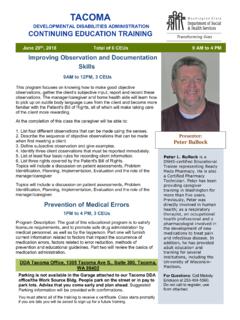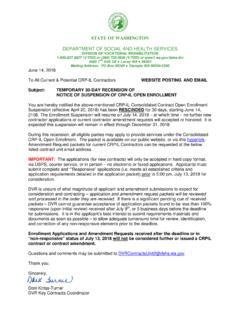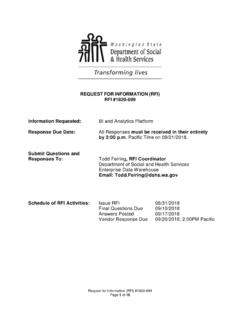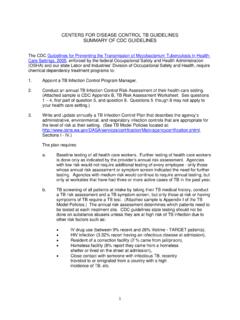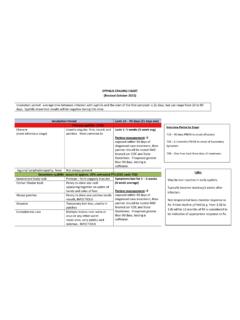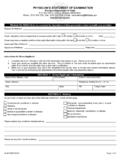Transcription of Brief Cognitive Screening Tools for Primary Care Practice - Wa
1 Brief Cognitive Screening Tools for Primary Care Practice Abstract Early detection and diagnosis of Alzheimer's disease and other Cognitive impairment presents as a critical issue facing Primary and specialty care providers in Washington State. In order to address the gaps and challenges faced by providers, the Dementia Action Collaborative offers the current paper to provide information and guidance around early detection and diagnosis of memory loss and dementia, including Alzheimer's disease. At the conclusion of this paper, providers should be able to identify indications and opportunities for detection, appropriate Tools , and care pathways for individuals and families affected by Cognitive impairment and dementia.
2 Introduction Alzheimer's Disease (AD) is a neurodegenerative disorder that poses one of the most formidable healthcare challenges of the 21st century. Of the million Americans currently diagnosed with AD, are over the age of 65, a population expanding by 10,000 people every day (1). The financial burden of AD on the economy in 2015 alone is estimated to be $226 billion, a cost predicted to significantly swell in upcoming decades (2). A recent study by Kelley and colleagues (3) indicates the average total cost per Fewer than half of all descendent with dementia exceeds that of all other patients with dementia conditions, including heart disease and cancer.
3 Emerging carry a diagnosis in their evidence also highlights the importance of early medical record. detection and accurate diagnosis in terms of improving management of comorbid conditions, reducing Alzheimer's & Dementia: The preventable hospitalizations and emergency room visits, Journal of the Alzheimer's clarifying wishes around end-of-life care and improving Association, March 2015. advance care planning (4). Early detection is a critical issue for treating Mild Cognitive Impairment (MCI) and dementia, including AD. Emerging research suggests that MCI may be slowed or cognition and function improved via modifying cardiovascular and other risk factors through interventions addressing diet, exercise, sleep and alcohol consumption (5-7).
4 Additionally, treating depression and November 2017 Page 1 of 10. monitoring and treating metabolic, vitamin and endocrine abnormalities ( , preventing hyperhomocysteine) has also been shown to decrease risk of developing AD as well as cerebrovascular disease (5-6, 8). The Finnish Geriatric Intervention Study to Prevent Cognitive Impairment and Disability (FINGER), a two year randomized controlled trial, found a positive effect of the multicomponent intervention on change in Cognitive function reinforcing the importance of a shift towards holistic, multimodal interventions aimed at modifying risk factors that occur throughout the life course.
5 Furthermore, behavioral interventions and graduated care plans typically are more successfully implemented at earlier stages of AD (7-9). Primary care providers are typically the front lines of dementia care and often the first point of contact for patients with concerns about Cognitive function. Despite this, fewer than half of all patients with dementia carry a diagnosis in their medical record (1). Physicians are often the most familiar with the longitudinal health and functioning of their patients, making them uniquely suited to screen patients for dementia.
6 However, limited appointment time, unwieldy Screening Tools and workflow disruption remain significant barriers to regular Screening . To best utilize Primary care settings for dementia screenings, a Brief , easy to administer, and psychometrically robust Screening tool is needed. Tools also need to be embedded within streamlined evidence based processes facilitating early detection and diagnosis (10). The purpose of this paper is to provide guidance for detection of Cognitive impairment in Primary care settings, thereby promoting early detection of MCI and dementia.
7 Consistent with the goals of the Washington State Plan to Address Alzheimer's Disease and Other Dementias, this paper seeks to promote setting-appropriate, evidence-based best practices around opportunities for case finding and detection, Cognitive Screening Tools , and care pathways for patients with Cognitive impairment. Opportunities for Screening Several Primary care encounters provide opportunity for Screening and detection/case finding for Cognitive impairment. These include visits or occasions when patients or families: Present with concerns or evidence of Cognitive impairment Have completed either online or community-based Cognitive assessments.
8 Given variability in administration, measures used and in the absence of additional medical information, these results may shape provider interests in completing more formal evaluation within the Primary care environment Present for a Welcome to Medicare or Medicare Annual Wellness Visit, for which Cognitive Screening is also a covered component Have increased risk for Cognitive impairment, including the presence of significant vascular risk factors and middle age, significant family history of Cognitive impairment, November 2017 Page 2 of 10. or presence of other medical comorbidities associated with increased risk for Cognitive impairment such as brain injury, sleep apnea, psychiatric conditions, polypharmacy, or metabolic syndrome.
9 While global Cognitive Screening remains an aspirational goal, implementation of more regular assessment of at risk populations would be an important first step. Screening Recommendations Consistent with the recent review by the Medicare Detection of Cognitive Impairment Workgroup recommendations (10), the Dementia Action Collaborative supports a model to rely on objective data around Cognitive functioning from patients and collateral informants. Given the unique demands and constraints of the Primary care visit, objective Screening measures must balance adequate sensitivity, specificity and other psychometric properties with ease of administration, ensuring congruency with operators and context that influences workflow.
10 In addition, the high prevalence of hearing loss in older adults may complicate identification and or treatment as Cognitive testing and follow up often relies heavily on a person's ability to hear and respond to questions and instructions. It is recommended that providers initially assess for sensory loss , provide appropriate treatment or referrals for additional diagnostic evaluation, and provide in-clinic assistive devices ( , Pocket Talker1) before any assessment of cognition is undertaken. There are a variety of Screening Tools and tests for hearing loss available for self- administration or use by non-hearing professionals2.

